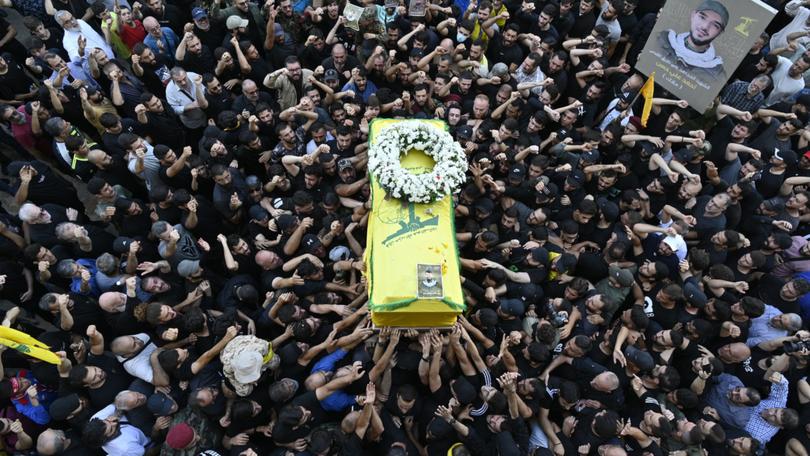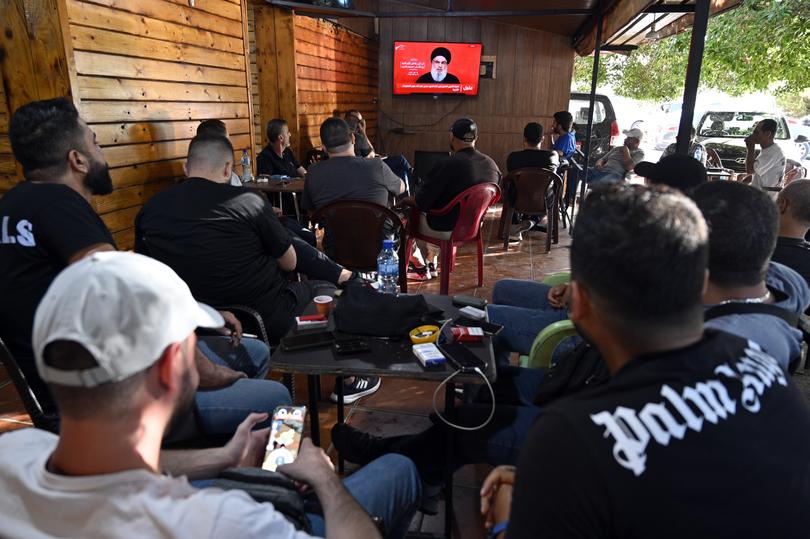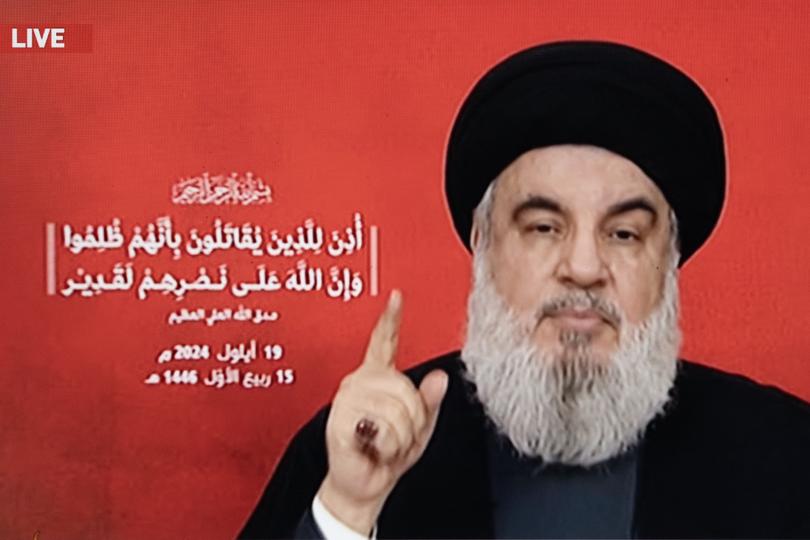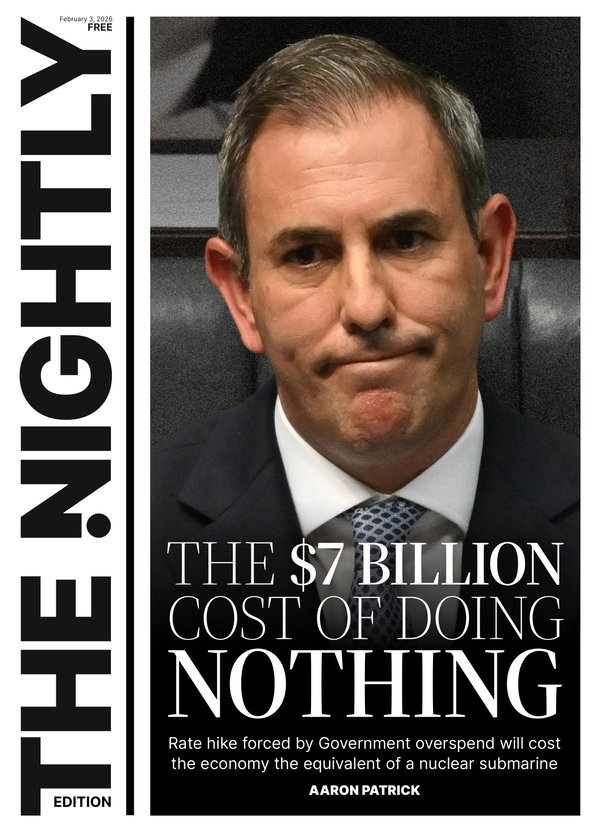Lebanon: Hezbollah threatens Israel, hopes troops will cross border for ‘Axis of Resistance’ crushing response
Hezbollah leader Hassan Nasrallah says he hopes Israeli troops cross the border to Lebanon so that the ‘Axis of Resistance’ can retaliate with a planned ‘crushing response’.

The Middle East is on the edge of all-out war as Hezbollah claims Israel’s “war crimes” crossed “red lines”, citing recent attacks that killed 37 people.
The comments come after two days of deadly blasts rocked Lebanon with thousands of pagers and then walkie-talkies simultaneously exploding in what has been described as a targeted attack.
Hezbollah leader Hassan Nasrallah broadcast a speech in which he issued a grim warning to the militant group’s foes as sonic booms from Israeli warplanes shook buildings in Beirut.
Sign up to The Nightly's newsletters.
Get the first look at the digital newspaper, curated daily stories and breaking headlines delivered to your inbox.
By continuing you agree to our Terms and Privacy Policy.Lebanon and Hezbollah have blamed Israel for attacks on Hezbollah’s communications equipment that killed 37 people and wounded about 3000, overwhelming Lebanese hospitals and wreaking bloody havoc on the militant group.
Israel has not directly commented on the attacks, which security sources say were probably carried out by its Mossad spy agency, which has a long history of carrying out sophisticated attacks on foreign soil.
“There is no doubt that we have been subjected to a major security and military blow that is unprecedented in the history of the resistance and unprecedented in the history of Lebanon,” Nasrallah said from an undisclosed location.
“This type of killing, targeting and crime may be unprecedented in the world,” he said, appearing in front of a featureless red background in his customary black turban.
The attacks “crossed all red lines,” he said.

“The enemy went beyond all controls, laws and morals,” he said adding the attacks “could be considered war crimes or a declaration of war, they could be called anything and they deserve to be called anything. Of course that was the intention of the enemy.”
As the broadcast was aired, deafening sonic booms from Israeli warplanes shook Beirut, a sound that has become common in recent months but has taken on a greater significance as the threat of all-out war has steadily ramped up.

Israel said its warplanes struck southern Lebanon overnight.
Hezbollah reported that air strikes resumed in the border area in the afternoon.
Nasrallah said Hezbollah hoped Israeli troops would enter southern Lebanon because that would create a “historic opportunity” for the Iran-backed group.
No military escalation, killing, assassinations or all-out war would return Israeli residents to the border area, he added, referring to a top war priority for the Israeli government.
While Nasrallah described the attacks as unprecedented, accusing Israel of trying to kill 5000 people, he also played down the effect on Hezbollah, saying the group’s structure had not been shaken.
“Yes, we received a big and harsh blow but this is also the nature of war,” Nasrallah said.
“We know that our enemy has superiority on the technological level and we have never said otherwise.”
Israel will face “a crushing response from the axis of resistance”, Iran’s Revolutionary Guards Commander Hossein Salami told Nasrallah on Thursday according to state media.
Two Israeli soldiers were killed in combat on Thursday in Israel’s north, the Israeli military said.
Israel’s N12 News said one of them was killed by a drone and the other by an anti-tank missile fired by Hezbollah across the Lebanese border.
Nasrallah said thousands of pagers had been targeted simultaneously, with some of the explosions happening in hospitals, pharmacies, markets, shops and streets busy with civilians, women and children.
“With this operation, the enemy violated all laws and red lines,” he said.
Hezbollah fired missiles at Israel on the day after the October 7 cross-border attack by the Palestinian militant group Hamas which triggered the Gaza war, and since then constant exchanges of fire have occurred.
Although neither side has allowed this to escalate into a full-scale war, it has led to the relocation of tens of thousands of people from the border area on both sides.
“The Hezbollah terrorist organisation has turned southern Lebanon into a combat zone. For decades, Hezbollah has weaponised civilian homes, dug tunnels beneath them and used civilians as human shields,” Israel’s military said.
“The IDF (Israel Defence Forces) is operating to bring security to northern Israel in order to enable the return of residents to their homes, as well as to achieve all of the war goals.”
Hand-held radios used by Hezbollah detonated on Wednesday across Lebanon, killing 25 people and wounding hundreds.
The previous day, hundreds of pagers - used by Hezbollah to evade mobile phone surveillance - exploded at once, killing 12 people including at least two children, and injuring more than 2300.
Lebanese Prime Minister Najib Mikati called on the United Nations Security Council to take a firm stand to stop what he called Israel’s “aggression” and “technological war” against his country.
Israel says its conflict with Hezbollah, like its war in Gaza against Hamas, is part of a wider regional confrontation with Iran, which sponsors both groups as well as armed movements in Syria, Yemen and Iraq.
- With Reuters
